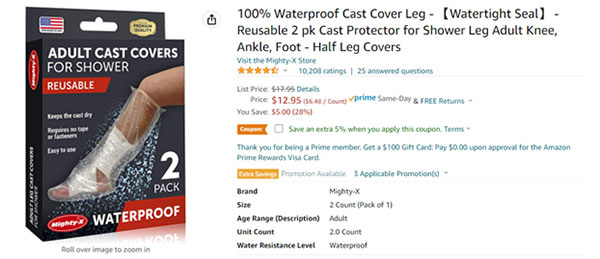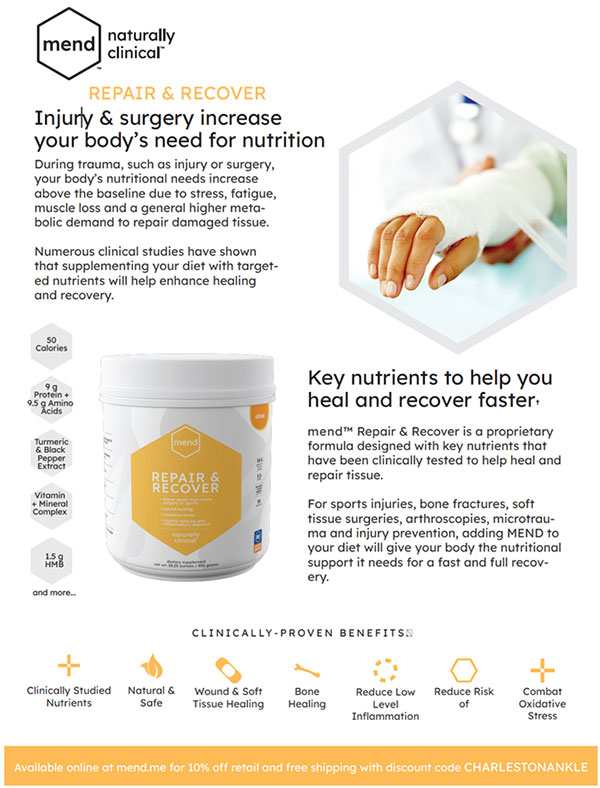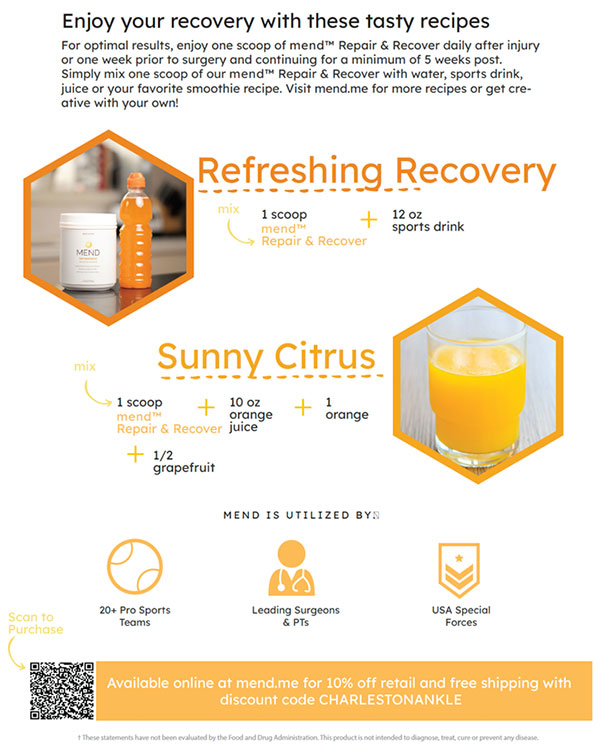The Foot & Ankle Team
Surgeons
Dr. Christopher Gross/Daniel Scott will perform your foot/ankle surgery and will guide all your care. While in the hospital, he is always assisted by a resident/fellow/Physician Assistant, who will help manage outpatient orders, prescriptions, and admissions. Depending on the case, the doctor will collaborate with other well qualified doctors for the best possible outcome.
Physician Assistants, Certified Athletic Trainers, and Nurses
Kelly Celek, PA-C, Brooke Cox, LAT, ATC and Abby Gullo, DAT, LAT, ATC are Dr. Gross and Scott’s primary assistants. They can diagnose and treat medical problems and have been trained through an accredited medical program. They will help to take care of you in the clinic setting. They will assist you in completing forms for time off work, FMLA, medication refills, etc. Please be patient as we provide great care to many patients and have busy clinical days.
Case Manager (Discharge Planner)
The case manager works closely with your surgeon to decide about your hospital discharge plan if you are admitted for an overnight stay. This person arranges any of your home health needs including setting up home physical and occupational therapy, as well as home nursing, if this service is needed. They make sure all the equipment you need at home is ordered, such as knee scooter, crutches, bedside commode. They can also help answer questions about what services your insurance covers. Unfortunately, only in rare circumstances do foot and ankle surgeries gain you entrance into a rehab facility.
Registered Nurses, Certified Medical Assistants, and Patient Care Technicians
Nurses and medical assistants work with you both in the hospital and the clinic. They follow your surgeon’s instructions regarding your care. They can teach you about your surgery, medications, and your care after surgery.
Bone Anatomy of the Foot and Ankle
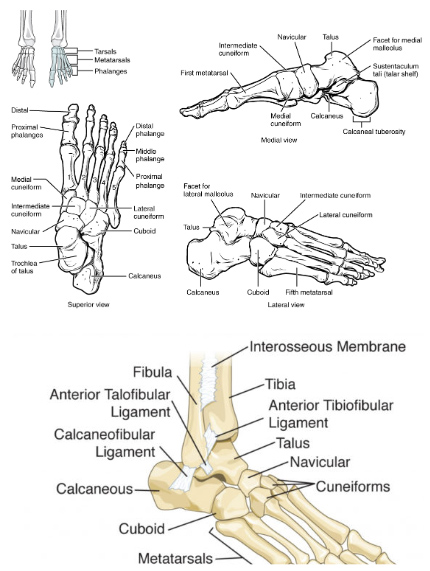
So, you are having surgery, what’s next?
Having surgery is a major decision and can take some time to come to terms with. Here you will find information on the process before surgery all the way up to the day of.
While at your doctor’s appointment
You should have received this packet, as well as a bottle of CHG surgical scrub. You will receive a call from the surgery scheduler within a week of signing the surgery consent. Please let the doctor know if you have ever had an anesthesia complication, as you may need to see our pre-operative clinic before surgery.
Things to keep in mind after you have left
Keep in mind that your surgery could be scheduled as much as 3 months out. There are multiple factors that create this wait time, to include:
- MUSC limits the hours that the doctors have in the OR
- Dr. Gross and Dr. Scott see and operate on both simple and complex patients from across the country
- The complexity of your procedure
Even if your procedure should only take 15 minutes it does not mean we can squeeze you in earlier given certain time constraints. Every surgery, no matter how long, takes 2 hours of prep from the staff. We will do everything we can to get you the earliest surgery appointment. If you would like, you can let the surgery scheduler know you would like to be put on a waiting list. This does not guarantee an earlier date but you could help.
“90-Day Global Period” – Please note that all post-operative appointments that fall within the first 90 days after surgery, will not require any additional appointment costs. Every subsequent appointment after 90 days (91+ days) is subject to regular insurance charges. This period does NOT apply to self-pay patients.
When you get the call from the surgery scheduler
They will set the surgery date and 1st post-op visit; the surgery time isn’t determined until the day before surgery. Please let us know if there is a preference and if you want to be placed on a cancellation list.
You will get a call and/or a MyChart message from the OR nurse who will tell you what time to arrive at the hospital for check-in and go over pre-op instructions i.e. what meds to take/not to take, answer questions about scrub, etc.
You will also receive a surgery letter in the mail from the scheduler to confirm surgery date, location, and when to expect the call with arrival time. It also gives a phone number to call if you haven’t heard from anyone by 4pm the day before surgery.
You must have someone stay at the hospital the entire time you are there for surgery…someone over 18 who can be responsible for you at least overnight. (you cannot take a cab or Uber)
Paperwork needed
Depending on your job, you could be out of work for some time. Do not forget to fax your FMLA or disability work to 843-792-3674. There is a $25.00 charge to have your paperwork released back to you or your place of employment. The paperwork will be completed within 2 weeks of you turning it in to us. Please be patient as we are taking great care of many patients at the same time.
Surgery Clearance
You will fill out an anesthesia questionnaire to determine if you need additional labs, tests, or a visit with our anesthesia team before surgery.
You may need clearance from your other physicians (cardiovascular, anesthesia, rheumatology, etc.) Please let us know if you are on blood thinners or have history of major cardiovascular, anesthesia or any other health events. Have written confirmation and clearance from those doctors as soon as possible and fax to 843-792-3674.
Setting Expectations for Surgery
The goal of surgery for both patients and surgeons is to improve a patient’s mobility, function, and decrease a patient’s pain. It is our privilege to be able to take care of you and to help you in this journey. Surgical expectations are what a patient believes they will achieve in terms of outcomes after surgery. However, sometimes a patient’s expectations can sometimes be far greater than the typical improvement patients experience after various surgeries.
Research shows that patients with anxiety or depression have higher expectations before surgery. These patients also have greater levels of pre-operative pain and a worse quality of life and function. There is a direct relationship between pain and depression (this road is two ways) in orthopedic literature. There is also evidence to suggest depression can increase the risk for post-operative infections.
Studies consistently show that patients with depression and anxiety have worse outcomes (pain and function) after surgery than those without these struggles. Surgery likely can provide great relief for patients, but the improvements are often somewhat less than patients without these problems. Not having expectations met does not mean that a patient has not improved from surgery. Many patients with anxiety and depression still have large improvements in their pain and function after surgery, and many are very happy that they underwent surgery and are happy with their outcome after surgery.
Surgery is close
1 week to go
- Please have a strategy to get back into your home after surgery since you will not be able to walk on one leg for at least 24 hours.
- Please obtain ambulatory assistive devices like a knee scooter or knee walker (list of providers at end of packet)
- Practice using your assistive device
- Stop any medications that increase the risk of bleeding. These include medications containing anti-inflammatory substances such as Aspirin, all NSAIDs (Celebrex, Advil, Motrin, Aleve, Advil, fish oils, herbs and supplements)
- If you take Coumadin, Plavix, Xarelto, Pradaxa, Eliquis or other blood thinning medications, follow the instructions given to you by the doctor that provided them to stop them. Please let us know if you do take them.
- If you take any GLP-1 agonists (Ozempic, Wegovy, Mounjaro, Trulicity, etc.) Please stop this medication 1 week prior to surgery.
- Please let us know if you have ever had a blood clot
The day before surgery
- You will receive a call between 2:00 and 4:00pm to let you know what time to come to the hospital. If your surgery is on a Monday, you will get a call the Friday before. It is important that you arrive on time to the hospital (generally 2 hours beforehand). If you are late, it may cause a cancellation of your surgery.
- If you do not receive a call by 4:00pm, please call 843-792-8803 for instructions.
- Use the antiseptic scrub (see directions on page 9 in this packet)
- Do not eat or drink anything after midnight the day before surgery. This will lead to surgery cancellation if ignored.
Important Skin Preparation Before Surgery
Bacteria and germs normally live on skin and do not usually cause a problem. However, they may contribute to an infection after surgery. Bathing with special antiseptic soap before surgery reduces the amount of bacteria on skin and will lower your risk of infection after surgery. The name of the special soap is Chlorhexidine Gluconate Scrub(CHG). If you did not receive the special soap from your doctor you can use an antibacterial soap.
- Do not use CHG soap if you may be allergic to CHG (chlorhexidine gluconate).
- Do not use CHG soap on genitalia (private parts).
- Do not use CHG soap on open wounds, sores or cuts.
- Do not use CHG soap near your eyes, ears or mouth. If it contacts these areas, rinse out immediately and thoroughly with water.
- Do not shave or remove any hair at or around the area of your surgery.
- If rash, redness, itching or any other symptoms occur, stop use immediately. If rash persists or worsens, contact your physician.
- Keep this product away from children. If swallowed, seek medical attention immediately or call a poison control center right away.
- This product is for your use only. Do not give it to anyone else.
It is important to take two showers or baths with the special CHG soap.
The night before surgery AND the morning of surgery:
Please shower or bathe the night before and the morning of your surgery. You will use half of the bottle of special CHG soap for each shower or bath. If it is not possible to shower or bathe completely, it is still important to attempt to wash your body, especially the area of your surgery, the best you can using the special CHG soap.
- Using your regular shampoo, wash and rinse your hair.
- Using your regular soap, wash and rinse your face and genitalia (private parts).
- Using the CHG Scrub soap:
- Use half (1/2) of the CHG soap for your shower or bath the night before surgery and the other half for your morning shower or bath.
- Apply the CHG soap on a clean, wet washcloth and lather your entire body from the neck down to your toes.
- Pay special attention to the area where you will be having surgery and wash this area for three minutes. If your surgery is above your neck or on your head, only use the special CGH soap on your body, do not use on your face, head or hair.
- It is important for the CHG soap to remain on your skin for three minutes so turn the shower off for three minutes and avoid rinsing.
- After three minutes, rinse the soap lather off your body. After rinsing do not use regular soap on your body.
- Dry yourself with a clean towel.
- Do not apply any powders, deodorants, lotions, creams, hair products, or make-up.
Dress in clean sleepwear or clothes.
The day of surgery
- Follow antiseptic bathing directions
- Don’t forget to brush your teeth
- Do not wear jewelry, body piercings, make up, or contact lenses
- Remove all nail-polish on hands and feet
- Take your morning medications (no pain meds) with a small sip of water unless you were directed otherwise by your physician.
What to bring to the hospital
- Driver’s license or photo ID
- Insurance and prescription drug cards
- Advanced directive, living will, Medical PoA (If you have them)
- Current list of medications, including any you stopped taking in preparation for surgery
PLEASE CALL IF:
- You develop a cold, sore throat, fever, flu, infection, rash of any kind, any symptoms of COVID
- Have burning pain with urination and have not been treated for infection.
- Have a gout flare up
- Have redness, swelling, skin rash, open wound that has not previously been seen by your foot and ankle surgeon.
Common symptoms after surgery
While everyone’s surgery outcome is individual in nature, some symptoms can be common. If you are experiencing anything not listed below or something you are uncomfortable with, please feel free to call 843-876-0111 and ask for the resident on call.
- Tight splint due to swelling
- Green tip falling off pin
- Cramping
- Numbness and/or tingling
- Abnormally increased pain after block wears off
- Bleeding through a dressing is normal, please reinforce with gauze and ACE bandage
How to obtain ambulatory aides
WHEELCHAIRS:
Most insurance companies do not consider the use of a wheelchair medically necessary for foot and ankle procedures. Please let us know as soon as possible if you think you will need a wheelchair. The staff will provide you with an order for the wheelchair. You will then contact your insurance company to see if they would pay for it.
KNEE SCOOTERS:
Most insurance companies will not cover knee scooters.
Ask clinical staff if you would like to obtain a knee scooter. The staff will provide you with an order for the knee scooter. You will then contact your insurance company to see if they would pay for it.
There are companies that rent them, or you can purchase one on Amazon starting at $150.00. Facebook Marketplace and Craigslist are popular websites to obtain used ones.
Durable Medical Equipment (DME) Companies are listed at the end of this packet.
CRUTCHES:
Will be provided to you by the OR staff after surgery
BEDSIDE COMMODE/SHOWER CHAIR:
Orders can be provided on an as-needed basis at the request of the patient. It is your responsibility to take the prescription to a local DME company (listed at the end of this packet).
EVEN-UP:
For any patients who will be wearing a walking boot, we recommend purchasing an “even-up” to help mitigate the height difference between the boot and a regular shoe. These can be purchased from Amazon or WalMart.
List of DME providers in Charleston
Floyd’s Brace
648 St. Andrew’s Blvd
Charleston, SC
(843) 573-9430
ABC medical
6185 Rivers Ave. Ste. F
North Charleston, SC 29406
Phone- (843)767-0580
Fax-(843)767-0510
Herbert’s Mobility
930 Ashley River Rd # B
Charleston, SC 29407
(843) 571-1515
TriMed (cold compression units)
1011 Lake Hunter Circle
Mt. Pleasant, SC 29464
(843) 971-8941
List of DME providers in Columbia
Hawthorne Pharmacy & Medical Equipment
2854 Sunset Boulevard
West Columbia, SC 29169
Tel: 803-794-7990
Fax: 803-739-0893
List of DME providers in Myrtle Beach
InCare Medical Equipment
4711 Highway 17 S., Bypass South
Myrtle Beach, SC 29577-6693
Phone: (843) 293-2122
List of DME providers in Beaufort
Beaufort Medical Equipment Inc.
2127 Boundary St, Ste 5
Beaufort, SC 29902
Phone: (843) 379-2800
List of online scooter rental websites
www.bencormedical.com (South Carolina local, one of the cheapest)
Facebook Marketplace, Amazon
Instructions for Icing for Pain Management
ONLY ICE IF NERVE BLOCK IS NO LONGER WORKING
Ice Machine - an ice machine circulates cold water through a pad. The cold water works the same way an ice pack works, but a lot easier to maintain. The unit requires water to be refilled about once a week, depending on how much you use the machine. This can be obtained through TriMed in Mount Pleasant. Please ask your provider and we will provide you with an order for this machine.
Ice pack - Something like a bag of peas or CryoMax cold pack can help reduce swelling and pain.
The CryoMax (can be bought at Walgreens/Walmart) remains cold for a good 4 hours, much longer than the traditional ice packs or even ice in a zip lock bag.
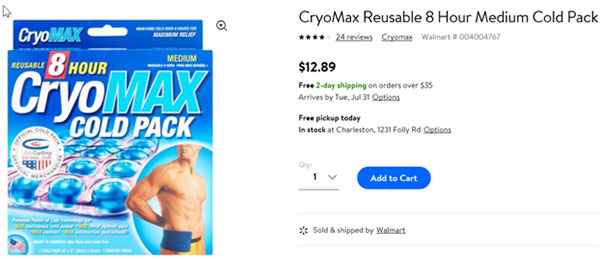
Cast Protector
Please use this to cover your cast, splint or incision before the first post-operative visits. Your
surgical dressings cannot get wet
